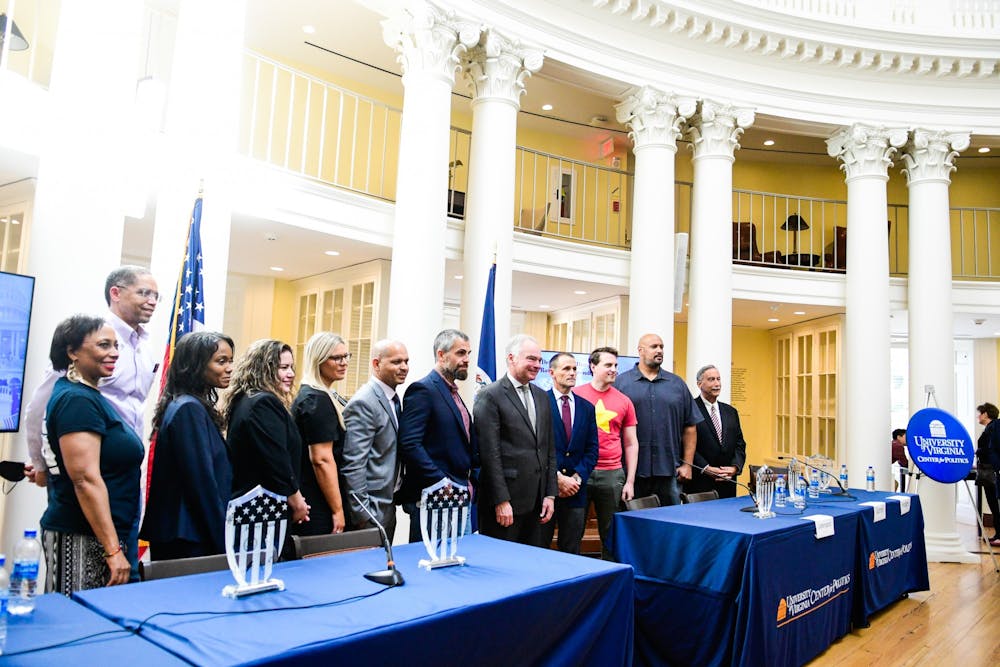The Center for Politics held a conference Friday to discuss the state of democracy five years after the events of Aug. 11 and 12, 2017 and one year after the insurrection at the U.S. Capitol. U.S. Sen. Tim Kaine (D-Va), shared his thoughts on faith and threats to democracy before honoring U.S. Capitol and D.C. Metropolitan police officers who received the first-ever Defender of Democracy awards.
The first event, “Religion, Secularity and Public Life,” began at 11 a.m. in Old Cabell Hall and concluded the six-year Religion and Publics Project, which was funded by the Henry Luce Foundation. About 75 individuals attended the event.
During both events, Kaine said the attack on the Capitol and the rally are deeply connected, as the perpetrators of both events fear losing their place in the “social order” by people of different religions, ethnicities and political affiliations.
“The attacks were explicitly anti-democratic, rejecting a decision by a democratically elected Charlottesville City Council regarding the statues and rejecting the decision delivered by 80 plus million Americans in the 2020 presidential election,” Kaine said.
White supremacists marched down the Lawn Aug. 11 brandishing toches and shouting racist, anti-semitic and homophobic chants to protest the removal of the Robert E. Lee statue from Emancipation Park. The next day, the “Unite the Right” protest turned violent when white supremacist James Fields drove a car through a crowd of counter protestors, injuring 19 and killing local resident Heather Heyer.
Less than four years later, a mob of individuals stormed the U.S. Capitol Building in an attempt to overturn the results of the 2020 U.S. presidential election on Jan. 6, 2021. During the insurrection, a joint session of Congress was in assembly to certify President Joe Biden’s victory — a session at which Kaine himself was present.
More than 100 officers were injured in the Jan. 6 attacks. At least seven people lost their lives in connection with the attacks, including at least four police officers who died by suicide. As of this month, 910 people have been charged with federal crimes related to the Jan. 6 attacks.
Kaine said that as citizens are losing faith in their government, events such as the rally and Capitol attack represent attacks on democracy.
“Part of the crisis in American democracy and local democracy is based on a citizenry believing that the system isn’t listening, isn't responding and isn't producing results,” Kaine said.
Kaine described the issue as a “stress-test” for democracy and said Americans should be confident in their values when confronting threats to the democracy.
“Humility makes us better listeners — [it] makes us less probable to exaggerate our own importance,” Kaine said. “It makes us better able to see the need for change and then be willing to change and grow.”
Nine officers received the “Defender of Democracy” award for their role in defending the Capitol Jan. 6. Recipients include Private First Class Harry A. Dunn, Officer Caroline Edwards, Officer Michael Fanone, Sergeant Aquilino Gonell, Private First Class Eugene Goodman and Officer Daniel Hodges. Private First Class Howard Liebengood, Officer Jeffrey Smith and Private First Class Brian Sicknick received the award posthumously.
Later in the day, Kaine concluded that he was proud of Virginia’s law enforcement for being the first to respond to the Capitol attacks. However, he emphasized that the country has so far failed to come together to confront threats to democracy — instead, Americans have chosen to fight over issues, such as whether the attack on the Capitol was a riot or a civilian protest.
Nonetheless, Kaine expressed optimism for the future. He said young people can still work to uphold the basic tenets of democracy through outreach to peers with different backgrounds.
“You have an opportunity here to be right in the classroom with people who are in countries that are struggling, and you can trade ideas and best practices and that can be helpful,” Kaine said.
CORRECTION: A previous version of this article misstated that only Private First Class Brian Sicknick received the award posthumously. Private First Class Howard Liebengood and Officer Jeffrey Smith also received the award posthumously.







